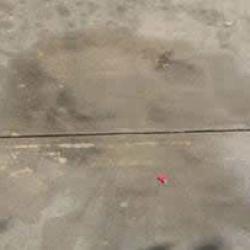Source Institutions
Source Institutions
Add to list Go to activity
Activity link broken? See if it's at the internet archive

In this activity, learners model ancient lunar impacts using water balloons. By measuring the diameter of the crater area, learners discover that the Moon's largest impact basins were created by huge asteroids! Like these huge asteroids, the water balloons are destroyed on impact and leave a splash (i.e. a "crater") that is 10 to 20 times wider than the impactor. Learners find the impact basins--the Moon's largest features--on a map and consider how they have changed since they first formed to become the dark patches ("maria") on the Moon's face. Learners may examine a type of Earth rock (named breccia) that is also found on the Moon and that would have been shaped by the processes explored here.
This activity station is part of a sequence of stations that can be set up to help learners trace the Moon's 4.5-billion-year history from "infancy" to the imagined future. Learners tie together major events in the Moon's geologic history as a series of comic panels in their Marvel Moon comic books.
This activity station is part of a sequence of stations that can be set up to help learners trace the Moon's 4.5-billion-year history from "infancy" to the imagined future. Learners tie together major events in the Moon's geologic history as a series of comic panels in their Marvel Moon comic books.
- 10 to 30 minutes
- 10 to 30 minutes
- Over $20 per group of students
- Ages 8 - 14
- Activity, Lesson/Lesson Plan, Simulation
- English
Quick Guide
Materials List (per group of students)
- An outdoor area, such as a concrete patio or parking lot
- 5 water balloons
- 1 bucket (optional)
- 5 rulers or tape measurers
- Towel for cleaning up spills
- 1 sample of Earth breccia
- Illustrations and images of basin–forming impacts, basins, and asteroids
- Moon Map: Lunar Impact Basins
- Splat! station sign
- Splat! children's guide
- Kid Moon: Splat! comic panel
- Art materials, such as colored pencils, crayons, and markers
- Marvel Moon comic books
- Binder clips
- Access to water
- Pencils or pens
Subjects
-
Earth and Space Science
-
Astronomy
- Origins of Universe
-
Earth Structure
- Rocks and Minerals
-
Earth's History
- Geologic Time
-
Solar System
- The Moon
- Asteroids and Comets
- Origin of Solar System
-
Astronomy
-
Mathematics
-
Measurement
- Circles
-
Measurement
-
The Nature of Science
-
The Scientific Process
- Conducting Investigations
- Gathering Data
- Formulating Explanations
- Communicating Results
-
The Scientific Process
Informal Categories
- Outdoor Activity
- Toys
Audience
To use this activity, learners need to:
- see
- read
- be mobile
- touch
Learning styles supported:
- Involves teamwork and communication skills
- Involves hands-on or lab activities
Other
Components that are part of this resource:
Includes alignment to state and/or national standards:
This resource is part of:
- Lunar and Planetary Institute Educator Resources
- Explore! Marvel Moon
- Growing up Moon (activity series)
Access Rights:
- Free access
By:
Rights:
Funding Sources:
- NASA Lunar Science Institute
- Center for Lunar Origins and Evolution
